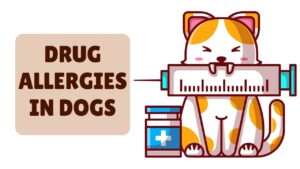As loving pet owners, ensuring the health and well-being of our furry companions is paramount. Among the various health concerns that can affect dogs, kidney disease stands out as a significant issue. Understanding the symptoms, causes, and treatment options for kidney disease in dogs is crucial for early detection and effective management. In this comprehensive guide, we’ll delve into all aspects of kidney disease in dogs, equipping you with the knowledge to recognize, address, and potentially prevent this condition.
Contents Overview
What is Kidney Disease in Dogs?
Kidney disease, also known as renal disease or renal failure, occurs when the kidneys lose their ability to function properly. The kidneys play a vital role in filtering waste products from the blood, regulating electrolyte balance, and producing hormones essential for various bodily functions. When kidney function deteriorates, it can lead to a cascade of health issues.
Symptoms of Kidney Disease in Dogs
Recognizing the symptoms of kidney disease in dogs is crucial for early detection and intervention. Here’s a closer look at each symptom:
- Increased thirst and urination: Dogs with kidney disease may drink more water than usual and consequently urinate more frequently. This excessive thirst and urination, known as polydipsia and polyuria, respectively, occur due to the kidneys’ reduced ability to concentrate urine, leading to increased fluid intake and output.
- Decreased appetite: A dog with kidney disease may show a decreased interest in food or refuse to eat altogether. This loss of appetite, known as anorexia, can result from the buildup of toxins in the body, nausea, or gastrointestinal disturbances associated with kidney dysfunction.
- Weight loss: Unintentional weight loss is a common symptom of kidney disease in dogs. As the body loses its ability to effectively process nutrients and eliminate waste products, dogs may experience a decline in muscle mass and overall body weight despite maintaining regular food intake.
- Lethargy or weakness: Dogs with kidney disease may appear lethargic, lacking energy, and reluctant to engage in normal activities. Weakness and fatigue can result from the buildup of toxins, electrolyte imbalances, anemia, or the body’s efforts to conserve energy in response to kidney dysfunction.
- Vomiting and diarrhea: Kidney disease can cause gastrointestinal symptoms such as vomiting and diarrhea. These digestive disturbances may arise from the accumulation of toxins in the body, electrolyte imbalances, or secondary complications such as gastritis or gastrointestinal ulcers.
- Bad breath with ammonia-like odor: Dogs with kidney disease may develop halitosis, or bad breath, characterized by an unpleasant ammonia-like odor. This odor results from the buildup of waste products in the bloodstream, which can be exhaled through the breath due to impaired kidney function.
- Changes in coat quality: A dog’s coat may become dull, dry, or unkempt as a result of kidney disease. Poor coat quality can stem from nutritional deficiencies, dehydration, hormonal imbalances, or metabolic disturbances associated with kidney dysfunction.
- Swelling of the abdomen or limbs: Some dogs with kidney disease may develop edema, or swelling, particularly in the abdomen or limbs. This swelling occurs due to fluid retention, known as ascites or peripheral edema, resulting from impaired kidney function and alterations in fluid balance within the body.
Causes of Kidney Disease in Dogs
Kidney disease in dogs can arise from various factors, including genetic predisposition, environmental toxins, infections, and underlying health conditions. Here’s a closer look at each cause:
- Age: Aging is a significant risk factor for kidney disease in dogs. As dogs grow older, the kidneys naturally undergo structural and functional changes, leading to a decline in their ability to filter waste products and maintain normal kidney function. Senior dogs are more susceptible to age-related kidney issues, such as chronic kidney disease (CKD), as their kidneys gradually lose efficiency over time.
- Genetics: Certain dog breeds have a higher predisposition to kidney disease due to genetic factors. Breeds such as Bull Terriers, Cocker Spaniels, Doberman Pinschers, and Shih Tzus are among those known to have an increased risk of hereditary kidney conditions. Genetic mutations or abnormalities may affect kidney development, structure, or function, predisposing dogs to renal disorders.
- Toxins: Exposure to certain toxins and chemicals can cause acute or chronic kidney damage in dogs. Common culprits include antifreeze (ethylene glycol), which is highly toxic to kidneys and can lead to acute kidney failure if ingested even in small amounts. Other potential toxins include certain medications (e.g., non-steroidal anti-inflammatory drugs), household chemicals, heavy metals (e.g., lead), and plants (e.g., lilies).
- Infections: Bacterial or viral infections affecting the kidneys can lead to inflammation, tissue damage, and impaired kidney function. Urinary tract infections (UTIs) caused by bacteria ascending from the bladder to the kidneys can result in pyelonephritis, a serious bacterial infection of the kidneys. Additionally, viral infections such as canine distemper virus or leptospirosis can directly target the kidneys, causing renal damage.
- Chronic conditions: Underlying health conditions can predispose dogs to kidney disease or exacerbate existing renal issues. Conditions such as hypertension (high blood pressure), diabetes mellitus, hyperthyroidism, and autoimmune diseases can negatively impact kidney function over time. These chronic conditions may lead to progressive kidney damage or increase the risk of developing secondary kidney complications.
- Dietary factors: Poor diet and nutritional imbalances can contribute to the development or progression of kidney disease in dogs. Diets high in phosphorus, protein, or sodium may impose increased strain on the kidneys and exacerbate existing renal dysfunction. Additionally, feeding human foods toxic to dogs, such as grapes, raisins, onions, or chocolate, can lead to acute kidney injury or other health problems.
Diagnosis and Treatment
Diagnosing and treating kidney disease in dogs requires a multi-faceted approach that involves thorough diagnostic evaluation and targeted therapeutic interventions. Here’s a detailed explanation of the diagnosis and treatment process:
Diagnosis:
- Physical Examination: A comprehensive physical examination by a veterinarian is the first step in diagnosing kidney disease in dogs. The veterinarian will assess the dog’s overall health, check for signs of dehydration, palpate the abdomen for any abnormalities, and evaluate other systemic signs that may indicate kidney dysfunction.
- Blood Tests: Blood tests are essential for assessing kidney function and detecting abnormalities in blood chemistry associated with kidney disease. Common blood tests include serum creatinine and blood urea nitrogen (BUN) levels, which reflect the kidneys’ ability to filter waste products from the bloodstream. Elevated levels of these waste products indicate impaired kidney function.
- Urinalysis: Urinalysis involves analyzing a urine sample for various parameters, including specific gravity, pH, protein, glucose, and the presence of blood or abnormal cells. Urinalysis can provide valuable information about kidney function, urinary tract health, and the presence of underlying conditions such as urinary tract infections or proteinuria (excessive protein in the urine).
- Imaging Studies: Imaging studies such as ultrasound or X-rays may be recommended to visualize the kidneys and detect any structural abnormalities, tumors, or signs of kidney enlargement. Imaging can help identify potential underlying causes of kidney disease and assess the overall condition of the kidneys.
- Additional Tests: Depending on the clinical presentation and suspected underlying causes, additional diagnostic tests such as urine culture and sensitivity testing, blood pressure measurement, or kidney biopsy may be necessary to further evaluate kidney function and identify specific disease processes.
Treatment:
- Dietary Management: Nutrition plays a crucial role in managing kidney disease in dogs. Specialized kidney diets formulated with reduced protein, phosphorus, and sodium content help ease the workload on the kidneys, maintain nutritional balance, and slow the progression of renal dysfunction. These diets may also contain added omega-3 fatty acids, antioxidants, and other beneficial nutrients to support kidney health.
- Fluid Therapy: Intravenous fluid therapy may be necessary to correct dehydration, restore electrolyte balance, and flush out toxins from the bloodstream. Fluid therapy helps maintain adequate hydration and blood flow to the kidneys, supporting renal function and improving overall well-being.
- Medications: Veterinarians may prescribe medications to manage symptoms and complications associated with kidney disease. Common medications include anti-nausea drugs to alleviate vomiting, phosphate binders to reduce phosphorus levels in the blood, and medications to control high blood pressure or treat secondary infections.
- Supportive Care: Regular monitoring of kidney function through follow-up blood tests and urinalysis is essential for assessing treatment response and adjusting management strategies as needed. In addition to medical interventions, supportive care measures such as maintaining a stress-free environment, providing comfortable bedding, and addressing any concurrent health issues help optimize the dog’s quality of life.
- Advanced Treatment Options: In some cases of severe or advanced kidney disease, advanced treatment options such as kidney transplantation or hemodialysis may be considered. These interventions are typically reserved for select cases and require specialized expertise and resources.
Preventing Kidney Disease in Dogs
While not all cases of kidney disease in dogs can be prevented, there are several proactive measures pet owners can take to reduce the risk and promote kidney health in their furry companions. Here’s a more detailed explanation of preventive strategies:
- Provide Adequate Hydration: Ensuring your dog has access to clean, fresh water at all times is essential for maintaining proper hydration and supporting kidney function. Encourage regular water intake, especially during hot weather or after physical activity, to prevent dehydration and promote urinary tract health.
- Balanced Nutrition: Feed your dog a balanced diet formulated to meet their specific nutritional needs based on factors such as age, breed, size, and health status. Choose high-quality commercial pet foods or consult with a veterinarian to develop a customized feeding plan tailored to your dog’s requirements. Specialized kidney diets may be recommended for dogs at higher risk of kidney disease or those with existing renal issues.
- Avoid Toxins and Hazards: Minimize your dog’s exposure to potentially harmful substances and toxins that can damage the kidneys. Store household chemicals, medications, and toxic plants out of reach, and be cautious when using products such as antifreeze, which contains ethylene glycol, a known kidney toxin. Keep your dog away from areas where pesticides, herbicides, or other chemicals are applied.
- Regular Veterinary Care: Schedule routine veterinary check-ups for your dog to monitor overall health and detect any early signs of kidney disease or other medical conditions. Regular physical examinations, blood tests, and urinalysis can help identify subtle changes in kidney function and allow for prompt intervention if needed.
- Maintain a Healthy Weight: Obesity can increase the risk of developing various health problems, including kidney disease. Help your dog maintain a healthy weight through portion control, regular exercise, and a balanced diet. Avoid overfeeding or feeding high-calorie treats excessively, and monitor your dog’s body condition regularly to prevent obesity-related complications.
- Manage Underlying Health Conditions: Address any underlying health conditions that may predispose your dog to kidney disease or exacerbate existing renal issues. Manage chronic conditions such as diabetes, hypertension, or urinary tract infections effectively with appropriate veterinary care, medication, and lifestyle modifications.
- Promote Dental Health: Poor dental hygiene can contribute to bacterial infections and inflammation that may affect overall health, including kidney function. Maintain good dental hygiene by brushing your dog’s teeth regularly, providing dental chews or toys for oral stimulation, and scheduling professional dental cleanings as recommended by your veterinarian.
- Monitor Medication Use: Administer medications as prescribed by your veterinarian and avoid giving your dog medications meant for humans without veterinary guidance. Certain medications, especially non-steroidal anti-inflammatory drugs (NSAIDs), can have adverse effects on kidney function if used improperly or in excessive doses.
Safe and Unsafe Foods
Diet plays a crucial role in managing kidney disease in dogs. Certain foods can help support kidney function and minimize stress on the kidneys, while others may exacerbate symptoms or contribute to further damage. Understanding which foods are safe and unsafe for dogs with kidney disease is essential for providing optimal nutrition and promoting overall health. Here’s a breakdown of safe and unsafe foods for dogs with kidney disease:
Safe Foods:
- Lean Protein: High-quality, lean sources of protein can be beneficial for dogs with kidney disease. Opt for lean meats such as skinless chicken, turkey, or lean cuts of beef or pork. These proteins provide essential amino acids while minimizing the workload on the kidneys.
- Egg Whites: Egg whites are an excellent source of high-quality protein and can be included in the diet of dogs with kidney disease. They are low in phosphorus and provide essential nutrients without adding excess strain to the kidneys.
- Low-Phosphorus Vegetables: Certain vegetables are low in phosphorus and can be included in the diet of dogs with kidney disease. Examples include green beans, carrots, cauliflower, and zucchini. These vegetables provide vitamins, minerals, and fiber without contributing to elevated phosphorus levels.
- Omega-3 Fatty Acids: Omega-3 fatty acids, found in fish oil or certain fish such as salmon or sardines, have anti-inflammatory properties and may benefit dogs with kidney disease. Consult with your veterinarian about incorporating omega-3 supplements into your dog’s diet to support kidney health.
- Apples (without seeds): Apples are a nutritious and low-phosphorus fruit that can be given to dogs with kidney disease as a healthy snack. Remove the seeds and core before feeding to avoid ingestion of cyanide-containing compounds.
- White Rice or Pasta: Plain white rice or pasta can serve as a bland, easily digestible source of carbohydrates for dogs with kidney disease. These foods can be included in homemade diets or mixed with lean protein and vegetables for balanced meals.
Unsafe Foods:
- High-Phosphorus Foods: Foods high in phosphorus should be avoided or limited in the diet of dogs with kidney disease, as elevated phosphorus levels can further stress the kidneys. Avoid feeding foods such as dairy products, organ meats, nuts, seeds, and whole grains, which are rich sources of phosphorus.
- High-Sodium Foods: Excessive sodium intake can contribute to fluid retention and hypertension in dogs with kidney disease. Avoid feeding salty snacks, processed foods, cured meats, and table scraps high in sodium content. Choose low-sodium or salt-free alternatives when possible.
- Fatty Foods: Foods high in fat can be difficult for dogs with kidney disease to digest and may exacerbate gastrointestinal symptoms. Avoid fatty cuts of meat, fried foods, fatty snacks, and rich sauces or gravies.
- Processed Foods: Processed foods, including commercial treats, canned foods, and pre-packaged meals, often contain additives, preservatives, and high levels of sodium or phosphorus. Opt for fresh, whole foods and home-cooked meals to ensure optimal nutrition and avoid unnecessary additives.
- Grapes and Raisins: Grapes and raisins are toxic to dogs and can cause kidney damage, even in small amounts. Avoid feeding grapes, raisins, or any products containing these ingredients to dogs with kidney disease.
- Onions and Garlic: Onions and garlic contain compounds that can damage red blood cells and lead to oxidative damage in dogs. Avoid feeding onions, garlic, or foods seasoned with these ingredients to dogs with kidney disease.
- High-Protein Diets: While protein is essential for dogs, excessive protein intake can strain the kidneys and worsen kidney disease. Consult with your veterinarian to determine the appropriate level of protein for your dog’s specific condition and adjust the diet accordingly.
Bottom Line
Kidney disease in dogs can have serious implications for their health and quality of life. By familiarizing yourself with the symptoms, causes, and treatment options outlined in this guide, you can be better equipped to recognize potential issues early on and seek appropriate veterinary care. Remember, proactive management and preventive measures are key to promoting kidney health and ensuring your furry friend enjoys a happy, healthy life.


































+ There are no comments
Add yours